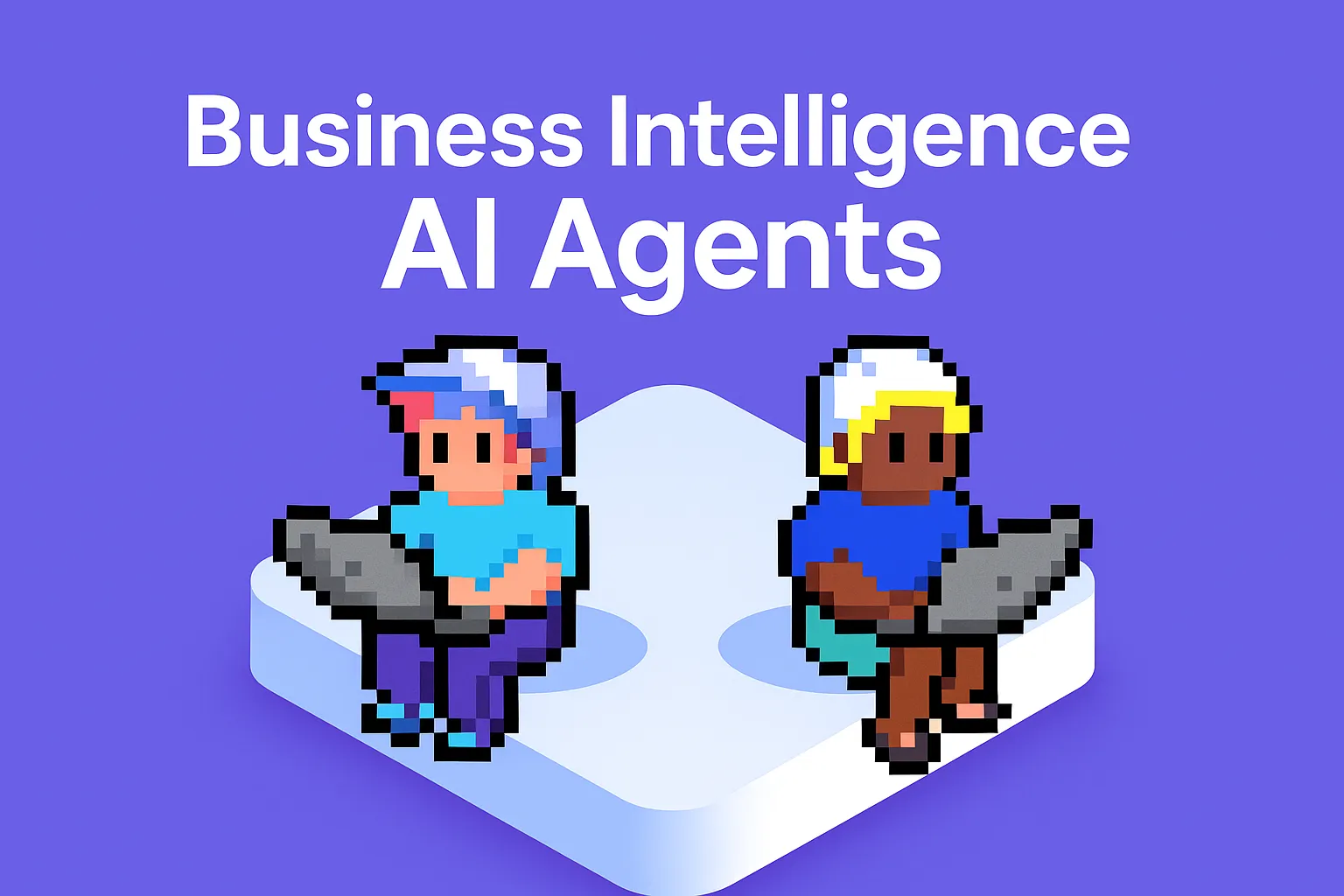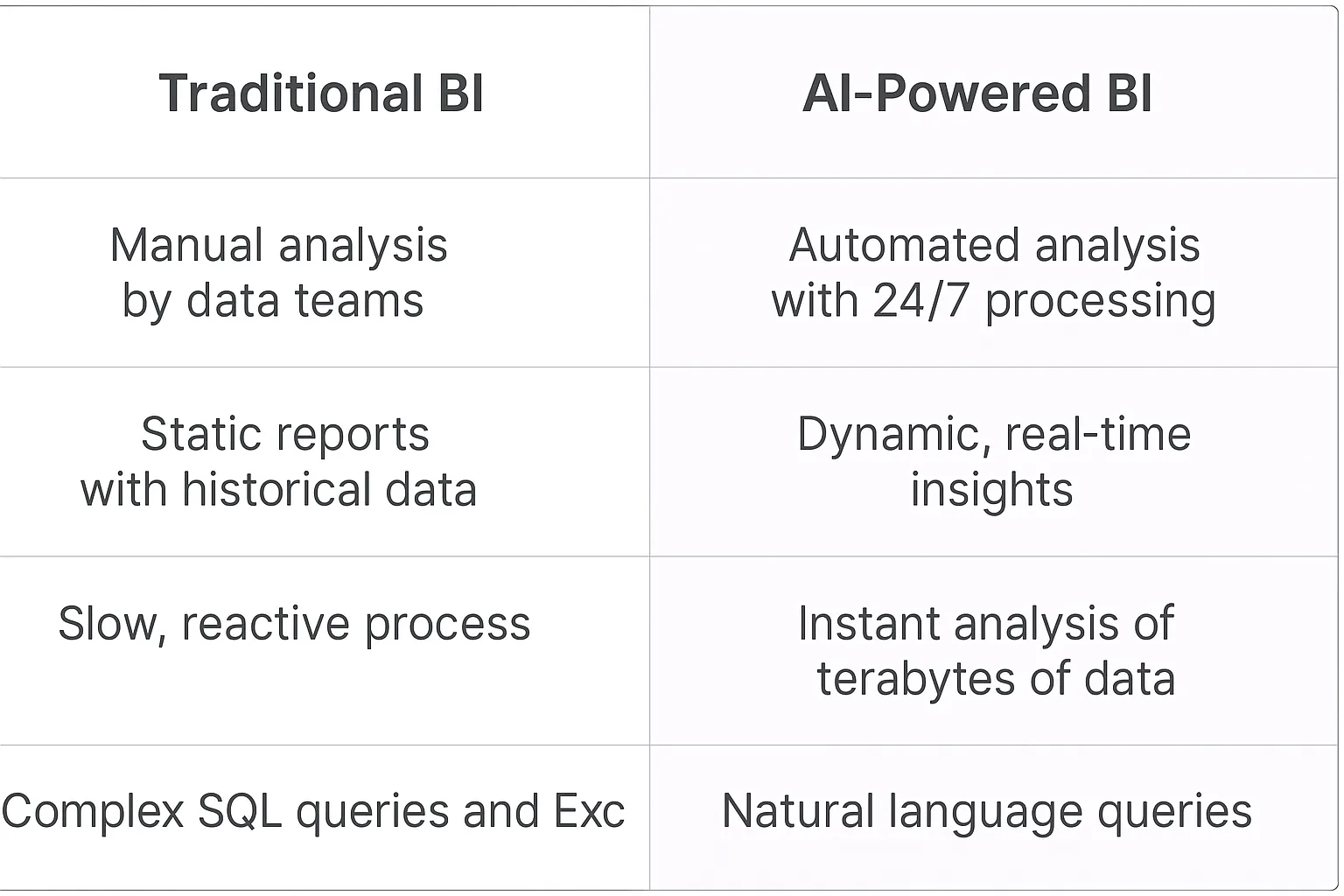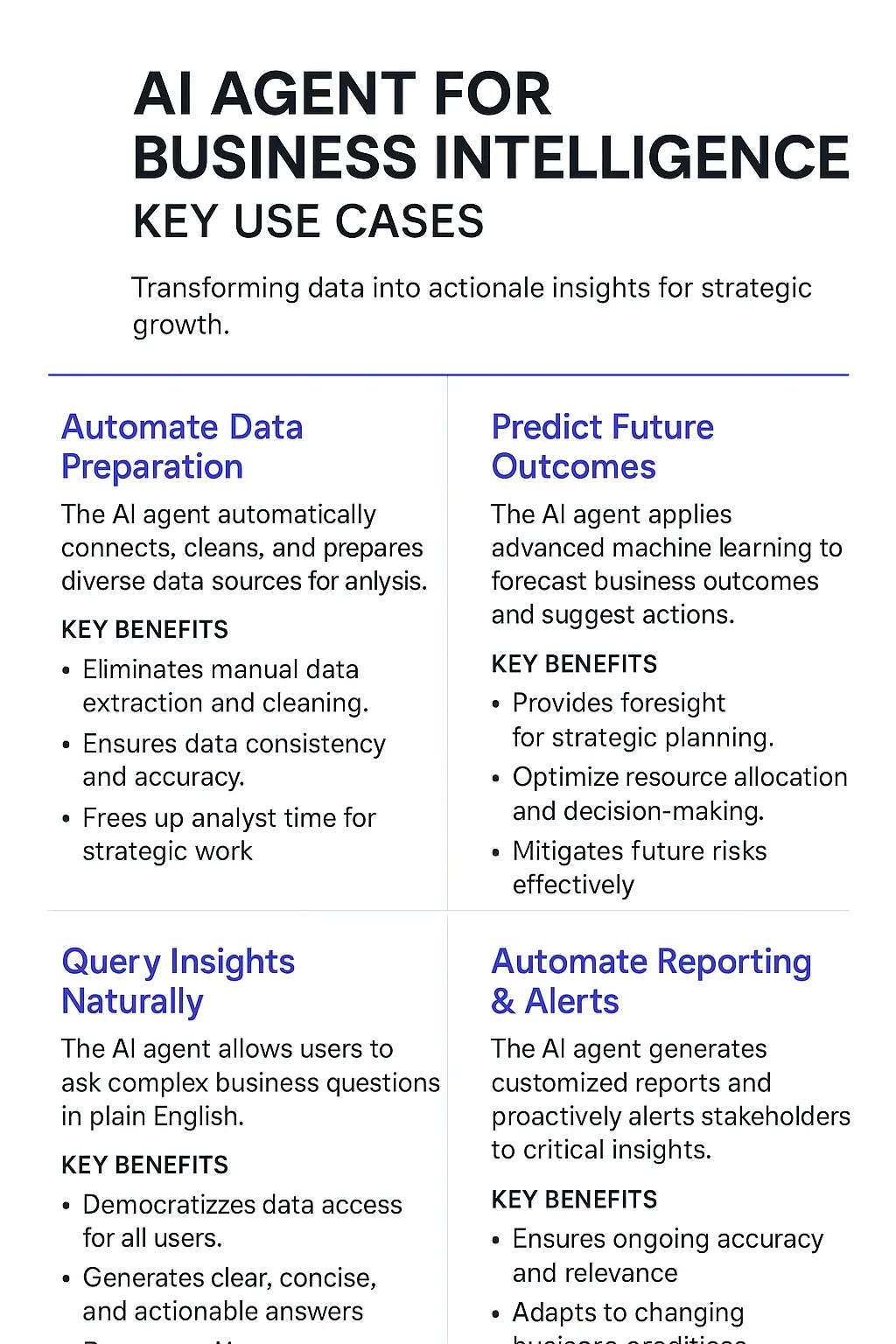Business Intelligence AI Agents
The Evolution of Business Intelligence with AI Agents
What is Business Intelligence?
Business Intelligence (BI) is the art and science of transforming raw data into actionable insights. It's the process of collecting, analyzing, and presenting business information to support better decision-making. Traditionally, BI involved complex data warehouses, SQL queries, and static reports. But with the advent of AI agents, we're witnessing a seismic shift in how businesses leverage their data assets.
Key Features of Business Intelligence
Modern BI, supercharged by AI agents, goes beyond simple reporting. It now encompasses predictive analytics, real-time data processing, and natural language interfaces. These AI-powered systems can spot trends, forecast outcomes, and even suggest actions based on complex data patterns. They're not just answering questions; they're asking the right questions and uncovering insights humans might never have thought to explore.
The key features include:
- Advanced data visualization
- Predictive and prescriptive analytics
- Natural language processing for data queries
- Automated data preparation and cleaning
- Continuous learning and model improvement
With these capabilities, BI is evolving from a tool for understanding the past into a crystal ball for shaping the future. It's not just about what happened, but why it happened, what will happen next, and what you should do about it.

Benefits of AI Agents for Business Intelligence
What would have been used before AI Agents?
Before AI agents entered the scene, business intelligence was like trying to solve a Rubik's Cube blindfolded. Companies relied on teams of data analysts, armed with complex SQL queries and Excel spreadsheets, to extract insights from their data. It was a slow, manual process that often led to analysis paralysis rather than actionable intelligence.
Traditional BI tools were static and reactive. They'd give you a snapshot of what happened, but couldn't tell you why it happened or what might happen next. It was like driving a car by only looking in the rearview mirror – useful, but not exactly optimal for navigating the road ahead.
What are the benefits of AI Agents?
Enter AI agents – the secret sauce that's transforming business intelligence from a backward-looking chore into a forward-thinking superpower. These digital teammates are like having a team of genius data scientists working 24/7, but without the need for coffee breaks or sleep.
First off, AI agents bring speed and scale to the table. They can crunch through terabytes of data in seconds, spotting patterns and anomalies that would take human analysts weeks or months to uncover. It's like going from a bicycle to a rocket ship in terms of data processing power.
But speed is just the appetizer. The main course is the depth and breadth of insights AI agents can serve up. They don't just tell you what happened; they tell you why it happened, what's likely to happen next, and what you should do about it. It's like having a crystal ball, but one that's powered by algorithms instead of magic.
AI agents also democratize data analysis. You don't need a Ph.D. in statistics to extract valuable insights anymore. With natural language processing, anyone can ask complex questions in plain English and get clear, actionable answers. It's like having a data-savvy assistant who speaks your language and is always ready to help.
Perhaps the most exciting benefit is the potential for continuous learning and improvement. AI agents don't clock out at 5 PM – they're constantly analyzing new data, refining their models, and getting smarter over time. The more you use them, the more valuable they become, creating a virtuous cycle of ever-improving business intelligence.
In essence, AI agents are turning business intelligence from a rear-view mirror into a GPS for your business. They're not just showing you where you've been, but actively guiding you towards where you want to go. And in the high-stakes game of business, that kind of intelligence isn't just nice to have – it's the difference between leading the pack and eating dust.

Potential Use Cases of AI Agents with Business Intelligence
Processes
AI agents are reshaping the landscape of business intelligence, offering capabilities that go beyond traditional analytics. These digital teammates are not just crunching numbers; they're interpreting complex data patterns and serving up insights that can drive real business value.
One of the most compelling use cases is in predictive analytics. AI agents can sift through vast amounts of historical data, identify trends, and forecast future outcomes with a level of accuracy that human analysts would struggle to match. This isn't just about predicting sales figures; it's about anticipating market shifts, customer behavior changes, and potential disruptions before they happen.
Another process where AI agents shine is in real-time data processing. In the world of business intelligence, timing is everything. These digital teammates can continuously monitor data streams, instantly flag anomalies, and trigger alerts for decision-makers. Imagine catching a supply chain hiccup or a sudden spike in customer churn as it's happening, not days or weeks later when it's already become a full-blown problem.
Tasks
When it comes to specific tasks, AI agents are proving to be invaluable allies in the BI toolkit. Take data cleaning and preparation, for instance. It's the unglamorous but crucial foundation of any analysis. AI agents can automate this process, handling missing values, identifying outliers, and standardizing formats across disparate data sources. This frees up human analysts to focus on higher-level strategy and interpretation.
Another task where AI agents excel is in generating natural language reports. They can take complex datasets and transform them into coherent, easy-to-understand narratives. This isn't just about spitting out numbers; it's about crafting stories that explain what the data means for the business. It's like having a tireless analyst who can write clear, insightful reports 24/7.
AI agents are also changing the game when it comes to data visualization. They can quickly experiment with different chart types, color schemes, and layouts to find the most effective way to represent data. More importantly, they can personalize these visualizations based on the preferences and needs of different stakeholders. The CFO might get a detailed financial breakdown, while the marketing team receives a more visually-oriented dashboard of customer engagement metrics.
Perhaps one of the most exciting applications is in augmented analytics. AI agents can act as intelligent assistants, guiding users through the analysis process. They can suggest relevant datasets, recommend appropriate analytical techniques, and even explain statistical concepts in plain language. It's like having a data science expert on call, democratizing advanced analytics capabilities across the organization.
The potential of AI agents in business intelligence is vast and still largely untapped. As these digital teammates become more sophisticated, we're likely to see a shift from reactive to proactive BI. Instead of just answering questions, these AI agents will start asking the right questions, uncovering insights that humans might never have thought to explore. This isn't about replacing human analysts; it's about amplifying their capabilities and pushing the boundaries of what's possible in business intelligence.

Industry Use Cases: AI Agents Transforming Business Intelligence
AI agents are reshaping the landscape of business intelligence, offering capabilities that go far beyond traditional data analysis tools. These digital teammates are becoming indispensable across various sectors, each with its unique data challenges and decision-making needs. Let's dive into some concrete examples of how AI agents are elevating BI practices in different industries, showcasing their ability to uncover insights, predict trends, and drive strategic decisions with unprecedented accuracy and speed.
From retail to healthcare, finance to manufacturing, AI agents are not just processing data – they're interpreting complex patterns, suggesting actionable strategies, and even autonomously executing data-driven decisions. This shift represents a quantum leap in how businesses leverage their data assets, moving from reactive reporting to proactive intelligence that shapes the future of organizations.
Retail's Data Revolution: BI AI Agents Reshaping Consumer Insights
The retail industry is sitting on a goldmine of data, but most companies are barely scratching the surface. Enter Business Intelligence AI Agents – the secret weapon that's about to turn the entire sector on its head.
Think about it: every purchase, every click, every abandoned cart tells a story. But who has time to sift through terabytes of data? That's where BI AI Agents come in, acting like a team of tireless analysts working 24/7 to uncover patterns and insights that humans might miss.
These digital teammates don't just crunch numbers; they're constantly learning and adapting. They can predict inventory needs before your store manager even realizes there's a shortage. They can spot emerging trends in real-time, allowing retailers to pivot their strategies faster than ever before.
But here's where it gets really interesting: BI AI Agents can personalize the shopping experience at scale. They're not just segmenting customers into broad categories; they're creating individual profiles for each shopper, understanding their preferences, habits, and even predicting their next move.
Imagine a world where your local grocery store knows exactly when you're likely to run out of milk and sends you a personalized offer just in time. Or a clothing retailer that can suggest outfits based not just on your past purchases, but on your upcoming calendar events.
This isn't just about boosting sales (although that's certainly a nice side effect). It's about creating a shopping experience that's so intuitive, so personalized, that customers feel truly understood and valued.
The retailers who embrace this technology aren't just going to survive; they're going to thrive in ways we can barely imagine. They'll be able to optimize everything from store layouts to supply chains, all while delivering a customer experience that feels almost magical.
So, if you're in retail and you're not looking into BI AI Agents, you're not just missing out on a trend – you're missing out on the future of your industry. The data revolution is here, and BI AI Agents are leading the charge.
Financial Services: BI AI Agents Cracking the Code of Customer Behavior
The financial services industry is sitting on a treasure trove of data, but most institutions are barely scratching the surface of its potential. That's where Business Intelligence AI Agents come in, ready to shake up the entire sector.
Think about it: every transaction, every loan application, every investment decision tells a story. But who has the bandwidth to analyze petabytes of data? That's where BI AI Agents step in, acting as a tireless team of analysts working round the clock to uncover patterns and insights that even the sharpest human minds might overlook.
These digital teammates don't just crunch numbers; they're constantly evolving and adapting. They can predict market trends before your top traders even sense a shift. They can identify potential fraud patterns in real-time, allowing banks to protect their customers faster and more effectively than ever before.
But here's where it gets really interesting: BI AI Agents can personalize financial services at an unprecedented scale. They're not just categorizing customers into broad risk profiles; they're creating individual financial fingerprints for each client, understanding their spending habits, investment preferences, and even predicting their future financial needs.
Consider a world where your bank knows exactly when you're likely to need a loan for a major purchase and proactively offers you the best terms. Or an investment firm that can suggest portfolio adjustments based not just on market conditions, but on your personal life events and long-term goals.
This isn't just about increasing profits (although that's certainly a welcome side effect). It's about creating a financial experience that's so intuitive, so personalized, that customers feel truly understood and valued.
The financial institutions that embrace this technology aren't just going to survive; they're going to thrive in ways we can barely fathom. They'll be able to optimize everything from risk assessment to product development, all while delivering a customer experience that feels almost prescient.
If you're in financial services and you're not exploring BI AI Agents, you're not just missing out on a trend – you're missing out on the future of your industry. The data revolution is here, and BI AI Agents are leading the charge, turning raw data into actionable intelligence that's reshaping the financial landscape.
Considerations
Technical Challenges
Implementing a Business Intelligence AI Agent isn't a walk in the park. It's more like trying to teach a toddler quantum physics while juggling flaming torches. The first hurdle? Data integration. Your BI agent needs to play nice with a smorgasbord of data sources - from legacy systems that predate the internet to cutting-edge cloud platforms. It's like trying to get a group of people who speak different languages to have a coherent conversation.
Then there's the issue of data quality. Garbage in, garbage out, as they say. Your AI agent is only as good as the data it's fed. If your data is a mess (and let's be real, whose isn't?), your agent will be spewing out insights that are about as useful as a chocolate teapot. Cleaning and preparing data is a Herculean task that often gets underestimated.
Let's not forget about scalability. As your business grows, your BI agent needs to keep up. It's like trying to upgrade a car's engine while it's speeding down the highway. You need an architecture that can handle increasing data volumes and complexity without breaking a sweat.
Operational Challenges
On the operational side, things get even trickier. First up: the human factor. Introducing a BI AI agent is like bringing a new player into a well-established team. There's bound to be some friction. Some employees might view it as a threat to their jobs. Others might resist change because, well, change is hard. You need to manage this cultural shift carefully, or your fancy new AI agent might end up being the office pariah.
Then there's the skills gap. Your team needs to level up to work effectively with this new digital teammate. It's not just about learning to use a new tool; it's about understanding how to interpret and act on AI-generated insights. This requires a blend of technical know-how and business acumen that doesn't grow on trees.
Governance is another can of worms. Who's responsible when the AI makes a mistake? How do you ensure the AI's decisions align with your company's ethics and values? It's like trying to teach a robot the nuances of human morality - not exactly a cakewalk.
Lastly, there's the ongoing maintenance and optimization. An AI agent isn't a set-it-and-forget-it solution. It needs constant fine-tuning and updates to stay relevant and effective. It's like having a high-maintenance pet that requires specialized care and feeding. Are you ready for that level of commitment?
Implementing a Business Intelligence AI Agent is a journey fraught with challenges. But for those who can navigate these choppy waters, the potential rewards are enormous. Just remember: it's a marathon, not a sprint. And maybe invest in some aspirin - you're gonna need it.
Embracing the Data Revolution with AI Agents
Business Intelligence AI Agents are not just a fancy new tool in the corporate toolbox; they're a paradigm shift in how businesses operate. They're turning data from a byproduct of business operations into a strategic asset that drives decision-making at every level.
The impact of these digital teammates goes beyond just faster analysis or prettier charts. They're fundamentally changing the questions businesses can ask and the problems they can solve. From predicting customer behavior to optimizing supply chains in real-time, the possibilities are limited only by our imagination and the quality of our data.
But let's be real: implementing BI AI Agents isn't a walk in the park. It comes with technical hurdles, operational challenges, and the need for a cultural shift within organizations. It's not about replacing human intelligence but augmenting it, creating a symbiosis between human creativity and machine processing power.
As we look to the future, one thing is clear: the businesses that thrive will be those that can effectively harness the power of their data. And in this new landscape, Business Intelligence AI Agents are not just nice to have – they're becoming as essential as electricity or the internet. The data revolution is here, and AI agents are leading the charge. The question isn't whether you'll join this revolution, but how quickly you'll adapt to stay ahead of the curve.













